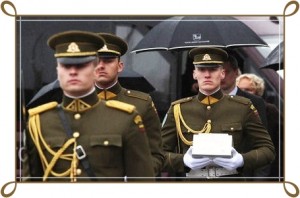C O M M E N T
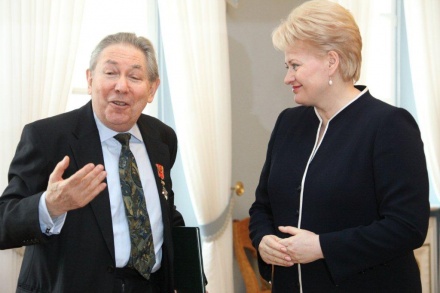
With the president: Professor Antony Polonsky wearing the Cross of the Officer of the Order for Merits to Lithuania. Photo: Džoja Barysaitė
VILNIUS—Professor Antony Polonsky of Brandeis University, one of the world’s most accomplished scholars of Polish-Jewish history and the long time editor of the seminal Polish Jewish history series Polin, was at the Lithuanian president’s palace today to receive from her excellency the prestigious Cross of the Officer of the Order for Merits to Lithuania. The award, pinned on his chest by President Dalia Grybauskaitė, was not for a lifetime of sterling work on Polish Jewish history, but it seemed, for several years’ staunch and perhaps somewhat naive loyalty to the public relations program of the current government of Lithuania, organized by the local Holocaust revisionism elite’s alleged top handler of “important foreign Jews,” Prof. S.arunas Liekis. The presidential press release, reported in English by Baltic News Service (BNS), put it this way:
“in recognition of his merits to the Republic of Lithuania and the promotion of Lithuania’s name in the world.”
That was why, presumably, he was unable today to attend the Jewish Community’s Holocaust Remembrance Day event, at which the community’s 83 year old chairman, Dr. Simon Alperovich, delivered a powerful rebuttal to the “Double Genocide” politics that have so assailed the memory of the Holocaust and its victims in this part of the world.
[UPDATE OF 30 JAN: According to sources in the Foreign Ministry here, the timing of the award was manipulated to the last to maximize its effect in the cause of “Holocaust PR” on behalf of the far right revisionist camp. It was injected to distract from the international attention to the Seventy Years Declaration launch of 20 Jan. and to confuse the tale to the extent that the New York Times columnist covering the foreign minister’s reaction to (heroic) Lithuanian parliamentarians who dared sign the declaration (he called them Putinist traitors and exclaimed that moustache length was all that distinguished Hitler from Stalin) would not even mention the Seventy Years Declaration. With the help of top operative Dr. S. Liekis of the “Yiddish institute” and the American Embassy, the Times reporter got an interview with the prime minister, and met with nobody from those of the second opinion who has issued the declaration that was the news of the week. Another case of “Polonsky to the rescue of state PR for the “history departments” of the Lithuanian government, thereby duly earning his prize for PR in the cause of obfuscating the Lithuanian Holocaust .]
The state sponsored campaign has included prosecutors’ investigations and defamation of Holocaust survivors (without any charge), criminalization of the standard historical narrative of the Holocaust, and glorification of the local Holocaust perpetrators. Observers have noted concomitant toleration of massive antisemitic activity capped in 2010 by a court’s legalization of public swastikas and in 2011 by yet another city-center neo-Nazi march with authorities’ legal blessing and participation of an official of the state-run Genocide Research Center. All the while, 1930s style front-pages accusing “The Jews” of the country’s economic woes continue to attract zero public comment from the same officials so eager to bestow awards on foreign Jewish luminaries.
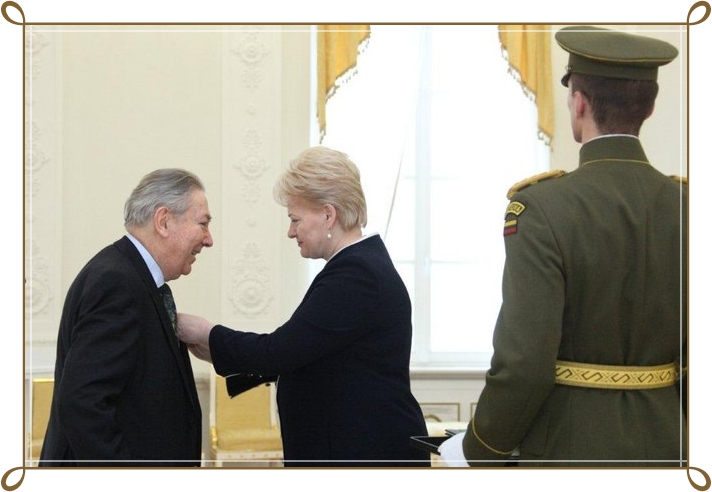
UPDATE OF 31 DEC. 2012:
Several months after the Polonsky coup, the same honor guard welcomed to Lithuania, for reburial with full honors, the remains of the 1941 Nazi puppet “prime minister” who personally signed documents confirming the fate of the Jewish citizens of his city, Kaunas. Details here
As usual, today’s annual Holocaust Remembrance Day event did not attract any notable government figures, because the state’s right-wing government is uncomfortable with the fact that the event marked on 27 January is the liberation of Auschwitz by Soviet forces. That in turn does not harmonize with the effort to convince the world that those who liberated Auschwitz are “equal” to its murderers, as per the “red-equals-brown” ideology that underlies East European governments’ efforts, symbolized most emphatically by the 2008 Prague Declaration, which has drawn pained criticism from Holocaust survivors and a number of scholars and political figures.
It was reported, but could not be confirmed, that the United States Embassy in Vilnius hosted a reception to honor Professor Polonsky’s award from the Lithuanian president. Other reports, also unconfirmed, said the embassy manipulated the visit of New York Times columnist Roger Cohen to reflect the Lithuanian government’s take while avoiding taking any note of opposition views; the journalist quoted Polonsky profusely, without mentioning his award from the government representing in effect one side of a debate.
The text accompanying today’s presidential award to Professor Polonsky did not try to mask that it is essentially for contributing to Lithuania’s Holocaust PR. It said that his work leads to “better understanding in academic and political circles.”
The politicization of Holocaust debates in Eastern Europe is now an accepted part of reality for people, institutions and governments on all sides of the argument. It is for now locked in, it seems, by the fact that vast state funds are being invested in projects to “change the history” for the whole of Europe and beyond under the (some would say Orwellian) banner of “reconciliation of histories.”
Last February, Professor Polonsky’s international prestige provided the prime cover for a conference in London. The published prospectus (as PDF) for the conference was craftily crafted under Lithuanian government influence, debunking both the “Soviet” and the “Jewish” narratives under the rubric of “simplified historical interpretations” (italics added), which presumably need to be replaced by the complicated, obfuscationary devices of Double Genocide historiography. The event was challenged in this journal and by Efraim Zuroff in London’s Jewish Chronicle.
The Brandeis professor remained silent on the eve of the conference, when informed that the Lithuanian government was vetoing the invitation to a scholar with a different opinion who had been recommended for balance by the head of the Department of Hebrew and Jewish Studies at University College London. It was, in the opinion of some observers, a classic instance of post-Soviet academic censorship in the cause of advancing a single view as Fact. It was also a case of funding-hungry Western departments proving perfect targets for nationalist East European campaigns of “rehistorification” via infiltration (via funding) of academia. Manipulation included exclusion of scholars and speakers from Lithuania’s Jewish community and from among those who disagree with the government’s Holocaust politics and machinations.
In the end, the conference was in part a PR disaster for the Lithuanian government, attracting substantive criticism on the pages of London’s Jewish Chronicle and the Jerusalem Post in addition to DefendingHistory.com.
With the conference organizers’ prior agreement and permission, professor and film maker Danny Ben-Moshe, read out at its concluding session a polite letter of protest to the Lithuanian government, signed by among others Lord Janner of Braunstone, MPs John Mann and Denis MacShane, London’s Rabbi Barry Marcus and Professor Ada Rapoport-Albert, chair of the hosting department. Shockingly, Professor Polonsky lashed out at the petition-reader, in a sequence that may be featured in the forthcoming film. The seemingly over-the-top loyalty to the Lithuanian government on the part of the major historian of Polish Jewry at a London conference left many onlookers dumbstruck.
The melee was reported (or perhaps misreported) in the Economist, where Polonsky’s former student and protege and current “Lithuanian government handler,” Professor Sarunas Liekis, presented himself as “a Yiddish studies professor from Vilnius,” a description never corrected in the Economist, or on the Prague Declaration’s Wikipedia page. In fact Liekis, who neither speaks nor writes Yiddish, played a key role in dismissing Lithuania’s only Yiddish professor (and its last resident Jewish professor) for having stood up for the Holocaust survivors defamed by prosecutors. It was in the Economist interview that Liekis equated the views of Holocaust survivors with those of the antisemitic establishment in Lithuania in the infamous phrase “between two talibans.” He is one of the government’s major “Jew Overseers” sent far and wide by the Foreign Ministry, which has deeply infiltrated the country’s academia. In addition to London, 2010-2011 trips on behalf of the Lithuanian government’s Jewish and human rights PR have included Kazakhstan, Prague, and Warsaw. More recently he appeared in Jerusalem, where his public ad hominem attack on this journal’s editor made the Jerusalem Post.
But Polonsky has a closer relationship to recent years’ events in Lithuania. Contacted by the Margolis family in 2008 to help campaign for Vilna Ghetto survivor and Jewish partisan hero Rachel Margolis, who was branded a ‘war criminal’ by Lithuanian prosecutors, he was quickly manipulated by Lithuanian authorities to report to the family that “all is well” and that she had been exonerated (to this day, no such document was ever produced, it was one of conflicting oral versions supplied verbally to different parties to dissipate concern). While betraying Margolis, Polonsky was rising as a star for the Lithuanian government’s PR units for his ability to silence Jewish public protest against the campaign against Holocaust survivors.
A permanent written testament to the episode is the preface that Polonsky agreed to write to the English translation of Rachel Margolis’s memoir (Boston 2012), which he used to “shift history” in the direction required by Lithuanian government officials, including the history of Lithuanian government involvement with Holocaust history in the years since the collapse of the Soviet Union. In addition to legitimizing various heavily politicized projects by the Lithuanian government to distort the historic record of the Holocaust, he tilted some modest number of conceptual degrees in the direction of the Lithuanian government’s redefinition of “genocide” to include Soviet deportations as part of the mechanics for “equalizing” Nazi and Soviet crimes and thereby (when recycled further by Baltic nationalists) writing the Holocaust out of history as a unique event in Lithuania’s history. Polonsky wrote there:
“Strictly speaking, the treatment of the Lithuanians by the Soviets since 1944 does not conform to the United Nations definition of genocide. However the fact that the goal of the Soviets was to prevent the reemergence of Lithuania as an independent state and that in the immediate postwar years, they deported nearly 120,000 Lithuanians to Siberia where many of them died because of the horrendous conditions makes the use of genocide to describe what was done to them legitimate.”
(Antony Polonsky, “Introduction” in Rachel Margolis, A Partisan from Vilna, Academic Studies Press 2010, p. 48)
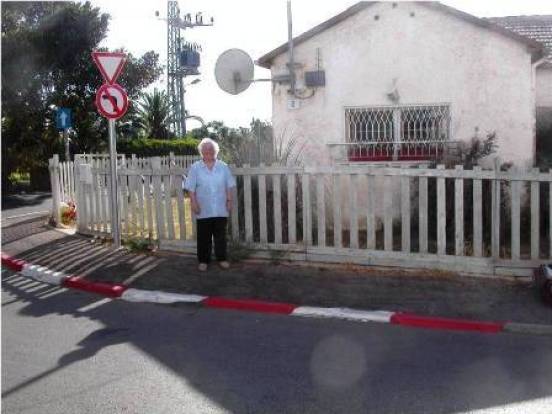
Did nobody think about inviting Cinderella to the ball? Dr. Rachel Margolis, 90, Vilna ghetto survivor, partisan hero, and Holocaust historian, outside her home in Rehovot, Israel. She was not invited to the Polonsky knighthood ceremony in Vilnius.
One of the people who was unable to attend the presidential ceremony at which Polonsky received his Cross of the Officer of the Order for Merits to Lithuania, is in fact Dr. Rachel Margolis, whose 90th birthday was celebrated several months ago, on 28 October 2011.
“Investigated” by prosecutors and pronounced guilty by the “Lithuanian Human Rights Association,” she feels unable to return to Vilnius for one last visit, which she would love to do on personal grounds.
Dr. Margolis is one of the Jewish Holocaust survivors being “sent to eternity” as suspected war criminals by the same Lithuanian government that honors compliant foreign Jewish professors. The investigations and defamation, all very public, have never been publicly withdrawn or repudiated by government officials.
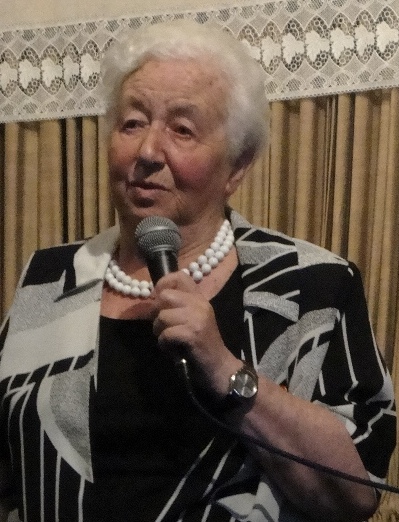
Dr. Rachel Margolis
Various diplomats have suggested that much could be accomplished by the president of Lithuania simply writing her a letter of appreciation for her life’s work and inviting her to come to Vilnius to show officials some historic sites in the Vilna Ghetto, or perhaps even just for lunch.
After all, a previous president and prime minister, the late social democrat Algirdas Brazauskas, awarded Margolis a certificate of honor for the same partisan activities for which she has been reviled by the current right-wing nationalist government.
![]() Something for Professor Polonsky to think about, relishing his Cross of the Officer of the Order for Merits to Lithuania, back home at Brandeis?
Something for Professor Polonsky to think about, relishing his Cross of the Officer of the Order for Merits to Lithuania, back home at Brandeis?
MEDIA: Website of the president of Lithuania (27 January 2012); BNS (27 January 2012); Lietuvos rytas (27 January 2012); Baltic Course (30 January 2012).
[UPDATE of 12 December 2012: Professor Polonsky’s letter to Monica Lowenberg who was barred from reading a five minute petition at the second UCL-Lithuania conference.]
